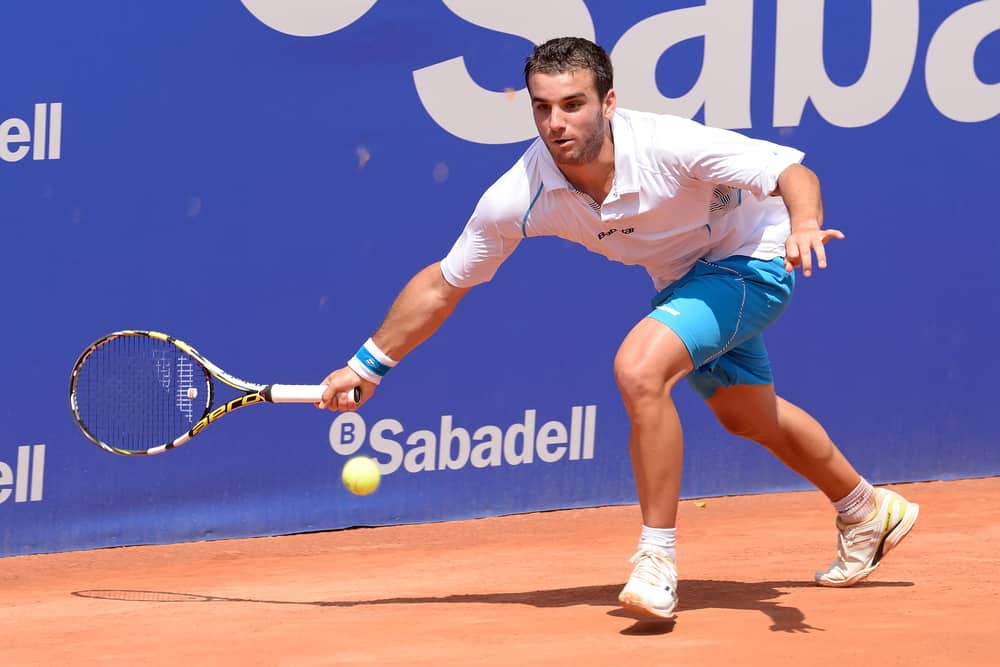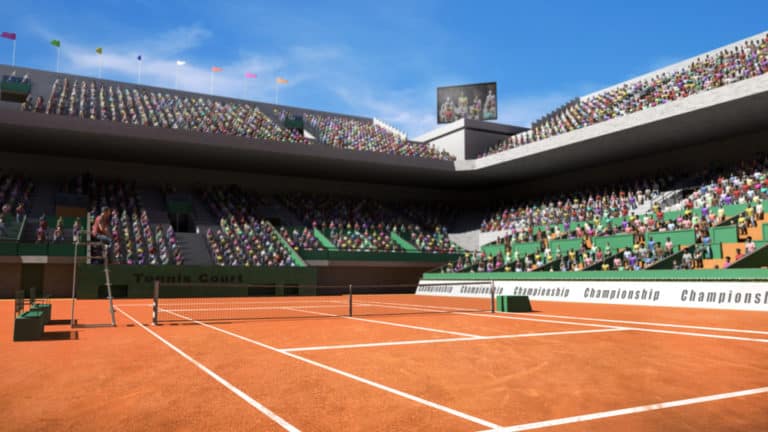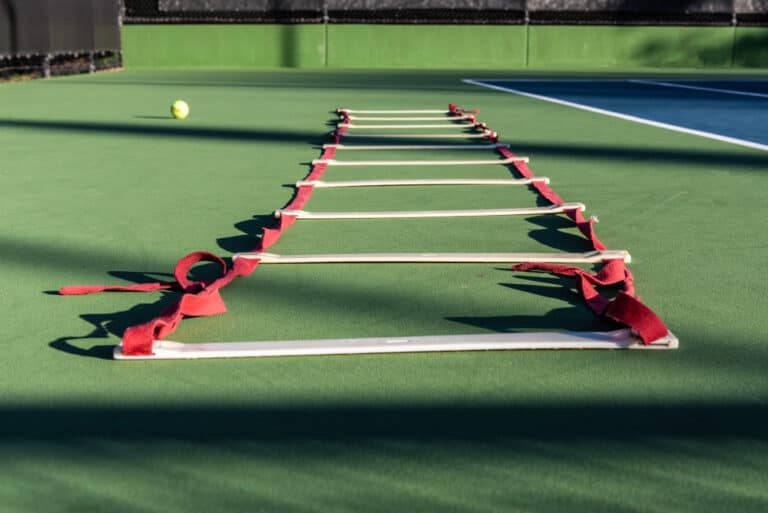How Do You Win A Deuce In Tennis?
Editorial credit: Christian Bertrand / Shutterstock.com
If you are a tennis enthusiast, you may wonder how to win a deuce in tennis. You probably love a win like all sports players, right? Knowing how you can win a deuce is the knowledge that will go a long way in your tennis career! If you are new to this game, the term deuce may need to be clarified. If so, this article is for you!
A deuce in tennis is won when a team or player wins two consecutive points after reaching the deuce. These points are won by manipulating the game’s momentum and knowing your opponent’s weakness. There are also common mistakes that cost you points, such as not paying attention to footwork.
You probably know tennis has one of the most confusing scoring systems ever invented! If you aim to win a deuce, it’s crucial to understand this scoring system and how you can lose points, preventing you from winning the game. Along with ways to manipulate the ball, there are also common mistakes you should avoid. Sometimes it’s more about what you shouldn’t do than what you should do!
How Can You Win A Deuce In Tennis?
A deuce is won in tennis when you win two consecutive points to break the tie. Once a player wins a point, they are given the advantage. You’ve won the deuce by winning a second point after the advantage. If a player or team wins a point but then loses again, the game returns to a deuce. Several factors can help you to win a deuce or cause you to lose.
Three Ways To Win A Deuce In Tennis
Before we discuss some common mistakes players make, let’s look at other factors you should also focus on during coaching sessions. There are many tricks to getting to know your opponent and using them to help you score. Here are three ways to increase your chances of winning a deuce in tennis.
Make Your First Serve Count To Win A Deuce
Your first serve should be flat, fast, and straight, as this will take a lot of work for your opponent to win. Aim for the middle line that divides the service boxes, and practice your serves before your match.
Try to practice a few shots on the court you’ll be playing before the match starts.
Hitting A Winner During A Tennis Match
When a player has a shot that bounces twice before the opponent manages to hit the ball again, this is called a winner. A volley, a good serve, or a groundstroke can cause winners. These are often achieved by playing more aggressively than you would during most of the game. This also helps you manipulate the match’s momentum and that of your opponent.
Add Volleys To Your Play To Win A Deuce
A Volley is an easy way to score a point and could be just what you need to win a deuce. Try to aim the volley at your opponent’s weaker side, as this will make it harder for them to respond. It would be best to wait until they lost momentum or became comfortable at the baseline to catch them off, guard. A volley is commonly known as an offensive rather than a defensive shot.
Common Mistakes Made By Tennis Players That Cost A Win
A deuce is when both players score 40-40, three points each. In a tennis game, this asks that extra bit from the player that wishes to win to get those extra two points. A deuce is where you can least afford mistakes that will cause a setback.
Some common mistakes include the following:
- Lack of momentum
- Hitting the ball too low
- Neglecting your footwork.
Let’s see how you can avoid these to help you win a deuce.
How Momentum Influences Your Chances Of Winning A Deuce
Continuous momentum to win a match or complete a move is crucial in tennis. There are different stages of momentum during a tennis match, and it’s vital to understand these to ensure you act accordingly. It is important to analyze which stage of momentum you’re in at any time of a match, as it will allow you to analyze your position and adjust your tactics accordingly.
When momentum is neutral between two players, it can be to your advantage or disadvantage, depending on how quickly you act. Neutral momentum is the part of a game where you have control over the momentum and can increase it on your terms if you play smart.
However, by the time you’ve reached a deuce in tennis, the momentum is unlikely to be neutral. At this time, you may find it to be in the opponent’s favor, and this is where you need to rationalize winning to avoid unnecessary mistakes and stay on top of your game.
If the momentum is to your advantage, be watchful of your opponent, as faking injuries has become the new way of slowing down opponents. If this happens, it gives the moment a fresh start and can go either direction.
Hitting The Ball Too Low During A Tennis Match
Whether you or your opponent is hitting the ball too low, you need to step up and bring it back to where you want it to be. Hit the ball cross-court as the middle part of the net is the lowest.
Even if you hit the ball a little too late, it will still be in the center of the court, giving you enough space on either side to miss by. This is a common mistake made by tennis players. If you are making this mistake, speak to your coach about ways to improve.
Neglecting Your Footwork During Tennis Can Cost You A Win
Footwork is what moves you and is, therefore, your most important tool in tennis. Good footwork helps you to adjust the momentum, manipulate the ball and catch your opponent off guard.
A lot can be said of a player judging by their footwork. Everything comes from your feet. This should be your focus during coaching sessions. If you make many mistakes, it could be due to poor footwork and have nothing to do with your overall body structure or techniques.
Your foot movements should be quick and bouncy. Absorbing enough shock to avoid injuries and fast enough to ensure you don’t miss a hit. If your feet feel heavy, investigate some off-court exercises you can do to improve muscle memory and overall footwork.

Conclusion
There are many ways points can be won or lost. It is important to know these and to keep focusing on your strong and weak points. Familiarize yourself with the scoring system so you know how to defend yourself in a dispute.
Know your opponents’ weaknesses and aim for shots that exploit them. Once you’ve realized their weak points, it will become easier to use them to your advantage. Try some backhand shots early in the game to gauge your opponent’s confidence with backhand shots.
References
- https://www.wtatennis.com/news/1443726/fit-for-tennis-the-importance-of-footwork-and-how-to-improve-it
- https://www.usta.com/en/home/improve/tips-and-instruction/national/tennis-scoring-rules.html
- https://youtu.be/TDfBzQShh00
- https://www.reddit.com/r/explainlikeimfive/comments/1vuvpq/eli5_how_tennis_is_scored_and_when_do_you_win/
- https://www.wikihow.com/Win-a-Tennis-Match







